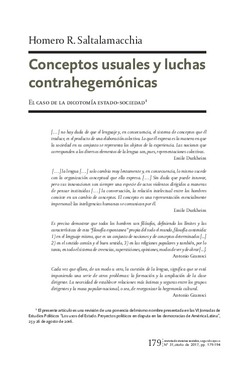Conceptos usuales y luchas contrahegemónicas : el caso de la dicotomía estado-sociedad
Fecha
2017-04Autor
Saltalamacchia, Homero R.Resumen
Los conceptos, las categorías y las clasificaciones son constructos cognitivos –con investidura afectiva– que nos permiten organizar nuestras percepciones y razonamientos, y son parte principal de cualquier lucha hegemónica. En este artículo, se retoma una discusión, ya iniciada en otro trabajo, que propuso el abandono de la dicotomía “estado/sociedad civil”, debido a su papel fundamental en la construcción hegemónica con la que el liberalismo ocultó las relaciones de dominación que cruzan nuestras sociedades. En este trabajo, después de sintetizar los argumentos esbozados en esa propuesta, recordaré la discusión sobre el poder de las clasificaciones (conceptos o categorías) en las conformaciones cognitivas y, por tanto, en las construcciones hegemónicas. Recuerdo que me permitirá vincular estos argumentos con los expuestos por Antonio Gramsci en torno a las luchas hegemónicas en las sociedades capitalistas más complejas, en las que cada institución es un lugar donde se produce la construcción hegemónica, y en el que, si se quiere lograr éxito en la supresión de las relaciones de dominación –o, por lo menos, lograr el apaciguamiento de su intensidad–, debe ejercerse una resistencia efectiva. El trabajo terminará con algunas conclusiones y la apertura de nuevos temas a discutir, particularmente en relación con el uso del enfoque sobre sistemas complejos, tanto en la teoría sobre el Estado-nación como para mejorar nuestras percepciones sobre las relaciones institucionales contrahegemónicas. Concepts, categories, and classifications are cognitive constructs –with affective investiture– that allow us to organize our perceptions and reasoning, and are a major part of any hegemonic struggle. In this article, I will return to a discussion, already begun in another work, that proposed the abandonment of the dichotomy “State/civil society”, due to its fundamental role in the hegemonic construction with which liberalism concealed the relations of domination in our societies. In this paper, after synthesizing the arguments outlined in this proposal, I will recall the discussion about the power of classifications (concepts or categories) in cognitive conformations and, therefore, in hegemonic constructions. Memento that will allow me to link these arguments with those exposed by Antonio Gramsci on the hegemonic struggles in the most complex capitalist societies, where each institution is a place where hegemonic construction takes place, and in what, if we want to achieve success in the suppression of relations of domination –or, at least, to achieve the appeasement of its intensity–, effective resistance must be exercised. The work will conclude with some conclusions and the opening of new issues to be discuss, particularly in relation to the use of the complex systems approach, both in nation-state theory and in improving our perceptions of counter-hegemonic institutional relations.

